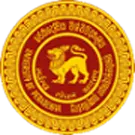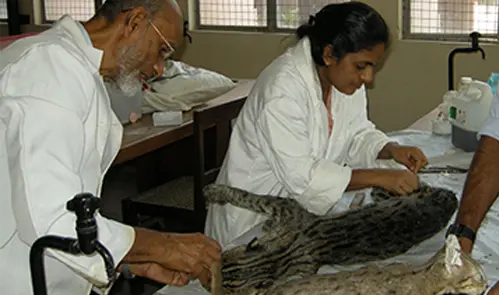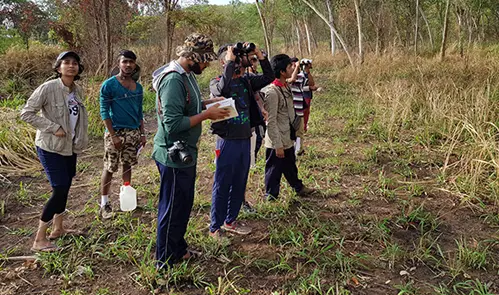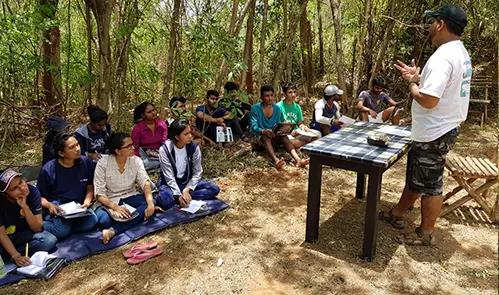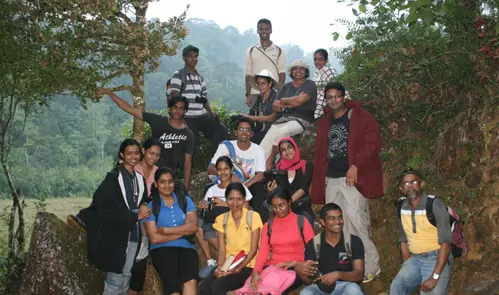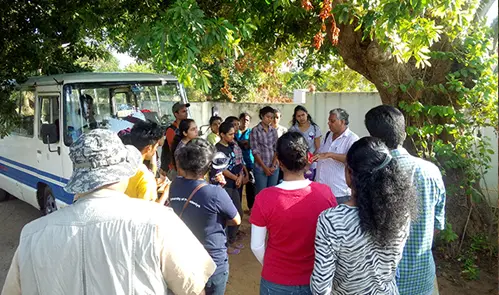"The study of the functioning of an animal in nature - how he goes about his business of being an animal - is in many regards the highest possible level of biological investigation."
- Alfred S. Romer,
Alexander Agassiz Professor of Zoology,
Harvard University.
Our Vision And Mission
The Department of Zoology strives to promote the study of basic and applied aspects of Zoology through teaching and research. During the first year the emphasis is on laying a strong foundation in Biology, and thereafter expanding that knowledge with a wide range of courses in Zoology in the second and third years. The Department emphasizes the applied aspects of Zoology in the fourth year, thereby promoting learning at every level.
The mission is to impart knowledge and skills in Zoology through studies ranging from the cellular to the ecosystem level and thereby produce quality graduates capable of contributing to the development of a knowledge based society through education, research and dissemination of knowledge in the relevant fields.
General Information
Today, the departmental cadre comprises 15 Academic Staff members, seven Technical Officers, one Computer Application Assistant, four Laboratory Attendants and one Labourer. The Academic staff, specialized in different disciplines of Zoology, conducts both undergraduate and postgraduate courses in addition to their research activities. The Technical Staff has experience and skills in all the disciplines of Zoology and IT related work.
The department conducts a comprehensive course in Zoology encompassing all the basic disciplines such as Animal Diversity, Ecology, Behaviour, Physiology, Genetics, Embryology and Histology. The Department lays stress on the applied aspects of Zoology through conducting courses in Techniques in Zoology, Fisheries, Entomology, Parasitology, Wildlife Management and Environmental Science.
The Department has a Museum where collections of animal specimens and skeletal material are maintained. A recent addition to the Department is the Invertebrate Systematics and Diversity Facility (ISDF), which holds the Smithsonian insect collections made in Sri lanka. This collection is currently digitized and data based for wider use.
At present there are more than 120 students following various courses offered by the department. 12 students follow the Special Degree Programme in Zoology and Biology.
The department conducts postgraduate research programmes through the Board of Study in Zoological Sciences of the Postgraduate Institute of Science. At present there are 13 Postgraduate students registered for M.Phi. and Ph.D. Degrees. These students are supervised by the Academic Staff members of the Department. In addition, M.Sc. courses in Wildlife management and Applied Epidemiology are available. Training Programmes, Workshops, Short Courses and Seminars/Conferences are also conducted in varied disciplines of Zoology from time to time.
History of the Department
The Department of Zoology of the Faculty of Science was established at the University of Peradeniya in July 1961, the second of its kind after the Department of Zoology at the University of Colombo, then referred to as the University of Ceylon. Department of Zoology was one of the five departments in the newly constituted Faculty of Science in Peradeniya, and was administered in the early years by its sister department at the University of Colombo. However, in 1963 the Department of Zoology came of its own with a staff of three headed by Prof. Hilary Crusz. The Special Degree programmes in Zoology commenced in 1965 at the University of Peradeniya with a batch of six students. With the increased intake of students to the Biological Science stream, the academic cadre began to increase, with Prof. Hilary Crusz being appointed the first Professor of Zoology.A second Chair in Applied Zoology was established in 2000 with Prof. F.P. Amerasinghe as the first Professor. Zoology was one of the three subjects offered to students following the B.Sc.degree in the Biological Sciences. About 30 students following the three-year General Degree programme offered Zoology while the number of students following the four-year Special Degree in Zoology ranged from 3-6. Today the Department of Zoology has become a vibrant institution that caters to the educational needs of a large number of students.
